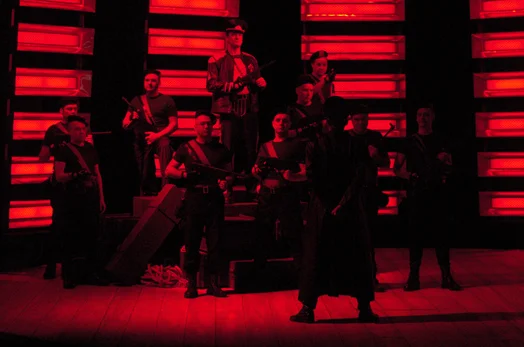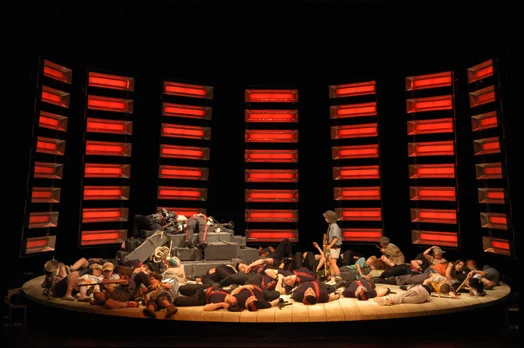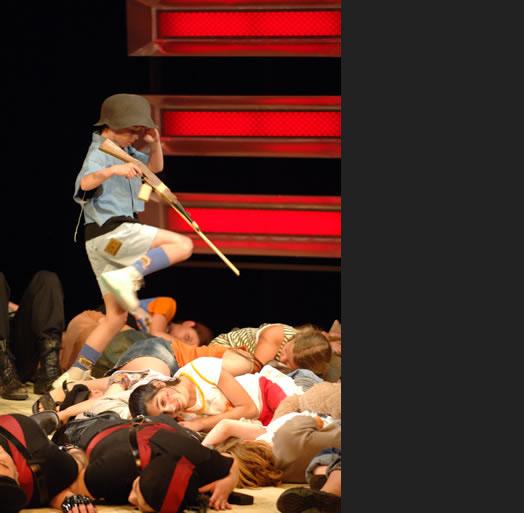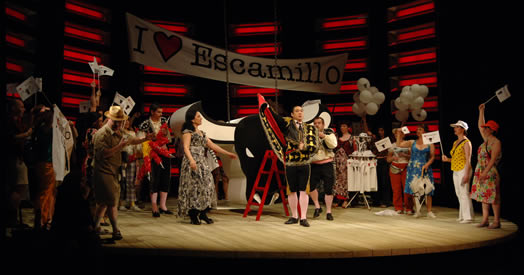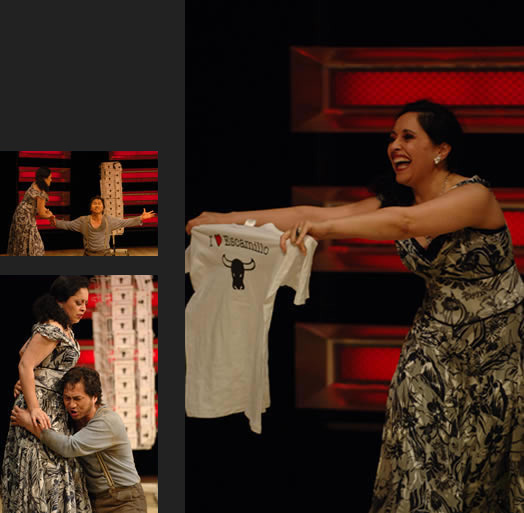CARMEN
OPÉRA COMIQUE IN FIVE ACTS BY GEORGES BIZET
FIRST ACT
SECOND ACT
THIRD ACT
FOURTH ACT
PHOTOS © Inka Lotz / foto-ed Meiningen 2006
PRODUCTION
Landestheater Eisenach
intendant: Michael W. Schlicht
co-production with Meininger Theater
intendant: Ansgar Haag
première Eisenach: 29 April 2006
première Meiningen: 5 and 7 May 2006
The concept of Carmen was awarded with the 1st Peter-Konwitschny-Nachwuchsregiepreis.
conductor: Tetsuro Ban / Stefanos Tsialis
stage director / set design: Michiel Dijkema
costume design: Claudia Damm
dramaturgist: Stefan Bausch
Don José: Enrico Lee
Escamillo: Dae-Hee Shin
Dancaïro: Helmut Kleinen
Remendado: François Soons
Moralès: Johannes Weinhuber
Zuniga: Jürgen Orelly
Lillas Pastia: Marcus Coenen / Ernst Volker Schwarz
Carmen: Lorena Espina
Micaëla: Sabina Martin
Mercédès: Krista Kujala
Frasquita: Monika Dehler
Woman from Sevilla: Elke Hartmann
Opernchor des Meininger Theaters
Landeskapelle Eisenach / Orchester des Meininger Theaters
Kinderchor der Max-Reger-Musikschule Meiningen / Kinderchor des Landestheaters Eisenach
PRESS QUOTES
“glowing arena of fatal erotic desires”
In the glowing arena of fatal erotic desires
Dijkema’s clever Carmen-production in Eisenach
[...] Michiel Dijkema, the winner of the Eisenach Peter-Konwitschny-Prize, was responsible for the stage direction and the set design. His achievement, which is full of ideas, deserves enormous respect; many more experienced stage directors would hardly have done a better job. Alone the basis, his consideration to symbolize the erotically overheated fighting atmosphere in this Andalusian boiler by a round platform of rough planks, similar to an arena, and by a battery of glowing red heaters, hits its mark, the immanent atmosphere of Bizet’s opera, with astonishing simplicity and precision. With carefully up-to-dated images Dijkema translates the 19th century Spanish Folklore-attributes into the all-round modernity. The local hero Escamillo for instance is promoted to a smooth posing pop-icon, who appears every time with a comet tail of fans and merchandising sellers. He shows the country girl Micaëla as a naïve girlie and the factory working girls as what they – at that time as well as today – currently are: colourfully ragged, but yet high-spirited poor on the seamy side of life (costume design: Claudia Damm).
In the intense chamber play of sensual-sweaty sexuality Carmen constitutes a superior but fatalistic exception: she does not appear as a femme fatale spurred on by sex, but she is using her erotic attractiveness as means to free herself from the social offside.
[...] Dijkema plays with the Carmen-clichés; he creates them very consciously, without breaking them.
Thüringische Landeszeitung
Wolfgang Hirsch
2 May 2006
“untameable vitality”
Konwitschny-Prizewinner Michiel Dijkema convinces with his production
Opera realism on the stage of the theatre Eisenach; a co-production with the theatre Meiningen made it possible. In spite of excellent soloists the result at the première was „Carmen” the chorus opera. With the amount of soldiers, factory working-girls, fans of the bullfighter, gypsies, street urchins and peeking children, the director brought together a variegated bunch of people, whose spontaneous yelling seems to be a primal element of the popular theatre and creates untameable vitality. Not withstanding all lightness, wanted both by the creators of the libretto and by the staging re-creator, a disquieting earnest is always present, without thinking of the bitter ending already.
Last year, the Landestheater Eisenach had the possibility to organize the Peter-Konwitschny-Prize, named after the illustrious director, who was present at the première. The first prize was awarded to the Dutchman Michiel Dijkema. This award came with the obligation to realize his “Carmen”-concept at the Landestheater. Ten more performances in Eisenach and five in Meiningen will follow.
The essence of his special performance seems to be the rejection of every convention in dealing with the chorus. It is as if he took his performers directly from the street. Dijkema created the set design as well.
To complete the visual aspect of the production, Claudia Damm (costumes) must be mentioned. Perfect colourfulness of a specific time at a specific place was created. Only with fantasy’s help, one will find Spanish colouring. This is in line with the folklore, which Bizet invented more than he imitated it.
Dr. Wolfram Klante
Thüringer Allgemeine
2 May 2006
“I am very happy, to have experienced this Carmen”
“There’s no shame in getting smarter”
A conversation with Peter Konwitschny on the goals of present-day opera-direction
[...] In Eisenach, where Peter Konwitschny was promoted patron of and name giver to a prize for young opera-directors, we spoke with him – after the “Carmen”-Premiere in the last row of the auditorium.
Welcome to the – supposed – province!
Province exists only in your head. It is not a question of place. In the performance tonight I sensed very clearly, that heart and mind must be addressed. I am very happy, to have experienced this “Carmen”.
[...] Why do you give your name to this Eisenach prize for young opera-directors?
When I was approached, I was at first quite shocked, because I am of course still alive. As I experienced more about the situation here and about the attitude of the intendant to the world and the theatre, as I learned it was not only about using my name, I agreed. For a long time, I considered myself only a son; a son of Franz and son of the other fathers. Apparently I now have become a father myself. I am honoured.
Avantgarde-productions are mainly produced my bigger theatres. Isn’t plane fair enough fort he smaller houses?
Absolutely not. In bygone days I staged in Greifswald “Gräfin Mariza”, in Altenburg “Freischütz” or “Satyros” by Goethe in Anklam. On the contrary: the higher one comes, the more soporific mind-numbing theatre one sees. Province is not to be found one the map, but somewhere else. From places, where productions as this “Carmen” are possible, comes the true progress.
Where you can observe, how a direction style develops?
Where you can see authenticity. There are productions, where you know upfront, when the curtain rises, that the director doesn’t want to tell anything, or doesn’t have anything to tell. There is a lacking in subjectivity, which is very important; the sincerity and the genuineness. A director as a human being must want to tell something in this world.
Thüringische Landeszeitung
Wolfgang Hirsch
3 May 2006
“an alert eye for details”
Bizet’s Carmen not only takes place on the outskirts of society, but is also extremely direct. Here, there are no taboos. Violence in various forms is latently present. Corruption, handling stolen goods and smuggling are of the order of the day. This premise is the starting point for Michiel Dijkema (winner of the Peter-Konwitschny-Prize for young opera directors) in his production for Eisenach. A very clear optical solution supports his intentions. The action takes place on big wooden disc. This is flanked by a multitude of over dimensional red-hot glowing heaters, which symbolize the southern heat. A few props mark the different locations. And there is something else, which is important to the director: Bizet’s music. Indeed, only a few moments are tragic and full of fate. But whole passages are very light, very rhythmic and characterize the vivid action strikingly accurate. With an alert eye for details Michiel Dijkema sketches individuals and situations. He makes clear, how tensions and conflicts start and develop. That he breaks with a cliché or two is refreshing. His Carmen for example isn’t a femme fatal. The men are not the object of her sexual desire, but she uses their macho-like state of mind, to be able to exist in this man’s world. […] A delight!
Christoph Suhre
Der Neue Merker, Vienna
17th year / No. 125
June 2006
“a well dosed interpretation-ambition”
The prize is hot
[…] Dijkema was not only the stage director, but designed the set as well and was responsible for the very clear, audible text version based on the German translation by Josef Heinzelmann. As if that would not be enough, he also had to deal with two premières in Meiningen (the co-producing opera house, which provided the opera chorus); such is German theatre reality. The result confirms the decision of the jury. Dijkema combines the proof of his professional skills with a well-dosed, personal interpretation-ambition, which at the same time gives the audience exactly that, what it doesn’t want to miss in a “Carmen”. […] The 32-year-old stage director has his ironic way with the clichés, as for example the modern marketing commotion surrounding the bullfighting-event and its star. At the same time he breaks those clichés, with the help of a group of tourists marching through the opera, or the old woman from Seville, who prowls about the story as an unique figure. He evokes the heat of the south (clearly defined as artificial) with seven batteries of heaters, which surround an inclining wooden disk. On this uniform set, which reminds of the inside of an arena, a half public chamber play on the asymmetry of feelings unfolds. Many ideas aim well-considered for the opéra comique, sometimes even use elements of operetta. Until the very end, when José, now with the gestures of grand opera, aghast by his murder in affect, breaks down, clasping Carmen’s corpse in his arms.
Joachim Lange
Die Deutsche Bühne
July-Number 2006
“an enormous and great Carmen-première [...] fantastic”
First co-production Meiningen and Eisenach offered an enormous and great “Carmen”- première
The destructive effect of a woman longing for boundless freedom
Fantastic was the carrying and far-reaching idea of the director, to have the whole take place as corrida in the scorching red heat of an Andalusian bullfighting arena. The physical heat was provided by towering pylons, which were fitted from top to toe with red-hot glowing heaters. […] Many other gags as well showed this is a director with many ideas and made clear why Michiel Dijkema has won the first Peter-Konwitschny-Prize for young opera directors.All together much more complex, than your average “Carmen”-production wants to make you believe. What Carmen a femme fatale, a sex-loving pick-up? Michiel Dijkema tries indisputably to give glow and polish to all facets of this Andalusian gipsy girl. […] Abundantly clear and therefore very successful Dijkema creates a balance of power between the characters.
Rudi Glaesner
Rhön- und Streubote
10 May 2006
“with a light hand and a touch of irony”
Under the Andalusian sun
A Dutchman stages “Carmen” in Eisenach and Meiningen
[…] The whole opera with its many genre scenes involving female cigarette workers during a break, a country girl among soldiers, an evening in the tavern, smuggler in the mountains, a publicity entrance of the current bullfighting champion with gypsy’s and soldiers and finally the preparation for the bullfight itself, were staged with a light hand and a touch of irony. As a running gag a funny old woman carts a shopping trolley filled with vegetables around.
Dijkema, set designer of his own production, had himself build a round wooden stage, which reminds of an arena. It is surrounded by semicircular arranged heaters – one thinks of the burning sun of Andalusia. The director conjures up a tourist Spain, which only exists in the exotic imagination of its guests, but does itself very well from those dreams. The bullfight procession is one single merchandising battlefield. Escamillo, showing of on a stand in the form of a black bull’s head, gets entangled in his black-golden sash, “only two euro, only two euro” sings the chorus and puffs bull’s head tanga’s and bull’s head T-shirts. Bullfight balloons explode with loud bangs. Also the relation Carmen-Escamillo is initially treated light-heartedly by the director – up to the moment where the failed soldier interferes with the gipsy girl and her next lover. She rather dies, than letting him patronize her. He doesn’t understand, begs because he wants to own her; he doesn’t let her go and kills her.
Irene Constantin
Freies Wort / Meininger Tagesblatt
2 May 2006

